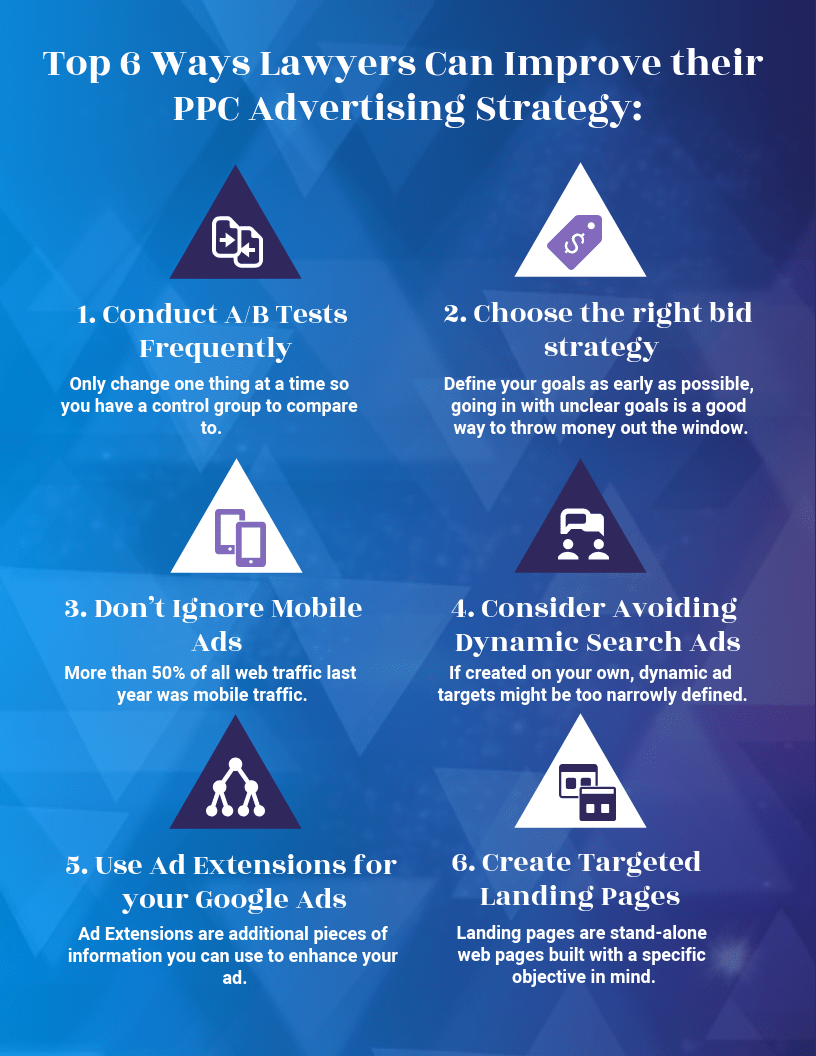A digital marketing strategy is the path to profitability. Optimum7 can help you set the right goals, offer and implement creative and technical strategies, and use data and analytics to review and improve your business’s performance.
Lawyers need to have a strong online presence to promote their firms and practices. More than thirty thousand law students graduate, pass the bar exam, and enter the American workforce per year, and dozens of experienced attorneys will compete to retain clients and serve them with due diligence. The Internet can make all the difference in creating a competitive advantage for law firms, by allowing them to improve branding in real time.
Clients can also have trouble finding lawyers with specialties. Over a dozen different fields of law exist, with changing terminologies and legal terms. Navigating to find a specialty lawyer can prove difficult for the average client. They have to search efficiently to satisfy their needs.
Advertising has also changed. Lawyers do not need to constantly invest in expensive billboards or local television spots to reach potential clients in their city, especially since paper advertising takes a fair amount of effort to update.

Optimum7 has ample experience navigating the Internet for law firms and practices. We are focused on helping you improve facets of your advertising and marketing strategy, including for PPC. Some of our PPC services include:
Our goal is to help you find clients, using the Internet, and solidify your branding. PPC is one such strategy that allows for both and increases user awareness of your firm on the Internet.
Speak to an ExpertPPC is pay-for-click ads, a form of advertising using search engine rankings. When a user clicks on a PPC ad, the advertiser pays the publisher for it; “publisher” in this case refers to the website that will display the ad. Google, social media, and other online sites are forms of publishers that determine ad placement. Google AdWords and BingAds are examples of popular PPC.
To make the ad, a firm must do keyword research first; they need to identify the terms that users type into search engines that are relevant to law specialties. A keyword cannot be too general or specific, because you want to reach as many potential clients as possible that are seeking your services. A contract expert, for example, does not want to advertise that they can handle mediation in family law, and a family mediator would not want to give advice on a civil litigation suit.
An ad also requires a target audience, one that will ideally respond to the ad positively and click on it. You can choose an audience based on demographics, location, and interests. Lawyers will most likely want to target adults seeking legal assistance, and center locations around law office addresses. This increases efficiency for both the firm and the client.
Advertisers have to bid to get an ideal placement, and often compete with each other. They bid on the cost-per-click (CPC), or rather, the amount they have to pay every time a user clicks on an ad. In this case, a lawyer or law firm would be the advertiser, and they need to use websites as leverage. Websites with better web design and relevance to the ad keyword are more likely to win reasonable bids.
Search ads appear in various search engines like Google or Bing as part of sponsored results. Advertisers only pay the publishers if users click on the ads. Since these are text-only ads, they are the most cost-efficient.
Display ads appear on websites related to a designated keyword that the advertiser chooses. For a lawyer’s website, the ads would appear on law resource pages and databases, or next to related YouTube videos.
For display ads, you will also require a clean graphic design that conveys your message clearly, especially on mobile devices.
Social media ads appear on social media sites and apps — Facebook, Instagram, Twitter, LinkedIn, and Tumblr. They can lead to user engagement and interaction with the advertiser. Ideally, users will create positive interaction, which in turn will lead to word-of-mouth online. You can also get feedback in real time, and understand user demand on social media.
Average Increase in Website Traffic
+97%Average Increase in Conversion Rate
+52%Monthly Total Leads Generated
3,000+We become an indispensable resource for our clients to drive traffic and leads.

Advertising can have a high price. You want to optimize your PPC ads so that you get a high rate of return on your budget. There are several methods that you can use to refine that return.
 Frequent A/B Tests
Frequent A/B TestsA/B tests involve testing two ads against each other for the same firm to see which has the best performance rates. Always check your headlines, copy, links, and display keywords. Treat this strategy like a scientific experiment; only change one variable per A/B test and measure the results accordingly. This will lead to unbiased data.
You want to spend a reasonable amount on bidding for the cost-per-click on each ad. Publishers will not comment if you overspend or toss money in the water; they will take the money. You need to define goals to create multiple bids, develop conversion or impression-based strategies, and decide if you want to improve on website views or on branding. Having a focus will help shape this budget.
Thousands of users will view websites and search engines on their phones, making up fifty percent of web traffic. You need mobile ads that will draw people’s eyes and gain a positive response. They also have a lower CPC comparatively, so you want to leverage their maximum potential.
Dynamic search ads are constantly changing banners that customize for individual users. Google uses in-house data to run them, but they do not make sense for law offices that need to convey information about specialties. It also determines which web pages on a site perform best and adjust their focus accordingly. The dynamic ads also exclude the pages they advertise from search engines, which could lead to fewer users seeing the
A digital marketing strategy is the path to profitability. Optimum7 can help you set the right goals, offer and implement creative and technical strategies, and use data and analytics to review and improve your business’s performance.